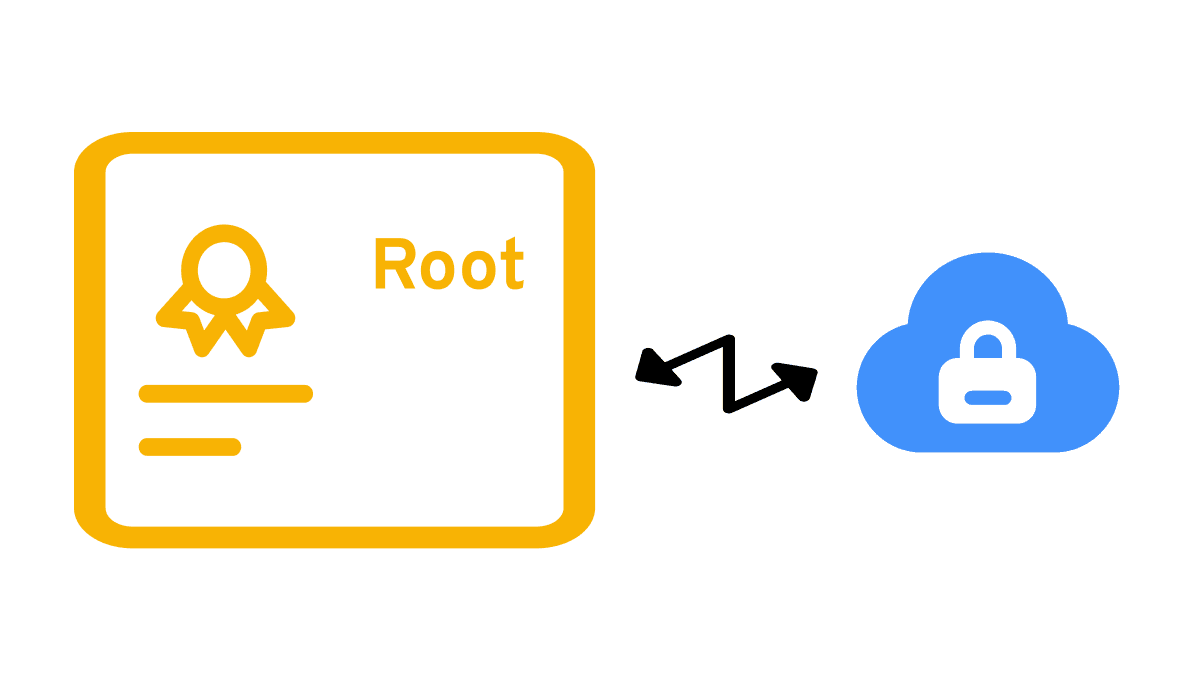
In the vast landscape of digital security, root certificates stand as the cornerstone of trust. Have you ever wondered how your browser decides which websites to trust? The answer lies in the magic of root certificates, the silent guardians of internet security. As cyber threats loom larger, understanding the role and importance of root certificates is more crucial than ever. This article will navigate through the intricate dynamics of root certificates, shedding light on their pivotal role in establishing a secure and trustworthy digital environment.
What is a Root Certificate?
A root certificate acts as a digital passport or anchor of trust, authenticating the identity of websites and enabling secure communications over the internet. It's issued by a trusted certificate authority (CA), forming the topmost link in a chain of trust. Root certificates are self-signed, meaning they are signed using their own private key, which distinguishes them from intermediate or end-entity certificates.
Root certificates emerged alongside the internet's expansion, solving the dire need for secure communication channels. Their development marked a milestone in digital security, laying the foundation for encrypted data exchanges. The concept of root certificates was introduced in the late 1990s as part of the Public Key Infrastructure (PKI) system, revolutionizing online security.
Today, root certificates hold an esteemed position in cybersecurity, underpinning the SSL/TLS protocols that safeguard millions of internet transactions daily. They are the bedrock upon which the entire structure of online trust is built, ensuring that when you connect to a website, you're actually communicating with the entity you intend to.
Key Characteristics of Root Certificates
Root certificates possess several unique characteristics that set them apart:
- Self-Signed: Unlike other certificates, root certificates are self-signed, creating a closed loop of trust.
- Long Validity Period: Root certificates typically have a validity period of 20-25 years, much longer than standard SSL certificates.
- Offline Storage: The private keys associated with root certificates are stored offline in highly secure facilities to prevent compromise.
- Limited Number: There are relatively few root certificates compared to the millions of SSL certificates in use.
- Pre-installed Trust: Root certificates come pre-installed in operating systems and browsers, establishing a base level of trust.
- Subject to Rigorous Audits: CAs that issue root certificates undergo strict audits and must comply with industry standards.
Functions of Root Certificates
Root certificates serve several critical functions in the digital ecosystem:
- Establishing Trust: They form the foundation of trust in the PKI system, allowing users to verify the authenticity of digital entities.
- Enabling Secure Communications: By validating SSL/TLS certificates, root certificates enable encrypted, secure communications over the internet.
- Facilitating Digital Signatures: Root certificates support the creation and verification of digital signatures, crucial for non-repudiation in electronic transactions.
- Supporting Certificate Hierarchies: They allow for the creation of intermediate certificates, enabling a scalable trust model.
- Enhancing Browser Security: Browsers use root certificates to identify and warn users about potentially unsafe websites.
- Enabling IoT Security: In the Internet of Things (IoT) realm, root certificates play a vital role in device authentication and secure communication.
How Does a Root Certificate Work?
At its core, a root certificate utilizes public key encryption to authenticate the identities of entities on the internet. Here's a detailed breakdown of its functioning:
- Public Key Encryption: Root certificates contain the public key of a CA, which corresponds to a private key used to sign other certificates, such as SSL/TLS certificates for websites.
- Trust Chain: When your browser receives an SSL/TLS certificate, it checks this against the root certificates stored within its trust store. If the certificate can be traced back to a trusted root, the connection is deemed secure.
- Verification Process: Imagine a globally recognized notary vouching for an individual's identity; similarly, a root certificate vouches for the authenticity of websites and services online.
- Certificate Revocation: Root certificates also play a role in the revocation process, allowing for the invalidation of compromised or misissued certificates.
- Cross-Certification: Some root certificates can cross-certify other root certificates, extending the web of trust across different certificate authorities.
Applications and Use Cases
Root certificates are instrumental across various sectors:
- E-commerce: They secure online transactions, instilling consumer confidence. When you see the padlock icon in your browser's address bar, it's a sign that the site's certificate traces back to a trusted root.
- Banking and Finance: Vital for protecting financial data and transactions. Online banking relies heavily on the trust established by root certificates.
- Email Encryption: Assures the authenticity and integrity of emailed messages, particularly important for sensitive communications.
- Healthcare: They play a vital role in protecting patient data and ensuring the integrity of electronic health records.
- Software Distribution: Many operating systems and software packages use root certificates to verify the authenticity of updates and installations.
Example scenarios include shopping on an online platform or accessing your online bank account, where root certificates work behind the scenes to encrypt and secure the interaction.
Advantages and Benefits
Root certificates offer numerous advantages:
- Enhanced Security: They provide a robust mechanism for authenticating digital identities, crucial for preventing phishing and man-in-the-middle attacks.
- Trust Establishment: Facilitate a trusted connection between users and services, vital for the digital economy's functioning.
- Universal Compatibility: Their widespread acceptance and integration into web browsers and systems ensure broad applicability.
- Scalability: The hierarchical nature of PKI, with root certificates at the top, allows for a scalable trust model that can accommodate millions of end-entity certificates.
- Standardization: Root certificates follow internationally recognized standards, promoting interoperability across different systems and platforms.
- Longevity: The long validity period of root certificates provides stability to the trust ecosystem.
Compared to previous security measures, root certificates offer a more standardized and universally trusted approach to digital security.
Challenges and Limitations
Despite their benefits, root certificates face challenges:
- Management Complexity: Ensuring that trust stores are up-to-date without overloading users with warnings is complex.
- Centralization Issues: The trust model relies heavily on CAs, posing risks if a CA is compromised.
- Adoption and Implementation: Inconsistencies across platforms and slow adoption of best practices can leave vulnerabilities.
- Revocation Challenges: Revoking a root certificate can have far-reaching consequences and is logistically challenging.
- Trust Issues: Incidents of CA compromise or misissuance can erode trust in the entire system.
- Quantum Computing Threat: The advent of quantum computing poses a potential threat to the cryptographic algorithms used in root certificates.
Future of Root Certificates
As technology evolves, so too must root certificates. Future developments may include:
- Blockchain Integration: Exploring decentralized models of trust using blockchain technology.
- Quantum-Resistant Algorithms: Developing new cryptographic algorithms resistant to quantum computing attacks.
- Automated Management: Implementing AI and machine learning for more efficient certificate management and threat detection.
- Enhanced Transparency: Expanding certificate transparency logs to improve oversight and quickly detect misuse.
Conclusion
Root certificates are the linchpin of digital trust, facilitating secure and confidential communications on a global scale. Their importance cannot be overstated in our increasingly digital world. As we navigate through evolving cyber landscapes, understanding and leveraging root certificates remains a critical endeavor for individuals and organizations alike. By providing a robust foundation for online security, root certificates continue to play an indispensable role in safeguarding our digital future.
FAQs
Q1: How can I view the root certificates on my computer?
A1: Most operating systems allow you to view root certificates through the security settings or internet options panel. On Windows, you can access them through the "Manage computer certificates" option in the Control Panel.
Q2: What happens if a root certificate expires?
A2: When a root certificate expires, any certificates signed by it may also be considered untrustworthy, potentially leading to security warnings or loss of functionality until the root certificate is updated. However, root certificates are typically replaced well before expiration to ensure continuity.
Q3: Can I remove a root certificate?
A3: Yes, users can manually remove root certificates from their trust store, but this should be done with caution as it could result in difficulties accessing securely encrypted websites. Only remove a root certificate if you're certain it's no longer needed or trusted.
Q4: How are root certificates updated?
A4: Root certificates are generally updated through system updates provided by the operating system manufacturer or manually by importing a new certificate.
About Us
Tencent EdgeOne offers a robust, combined solution that accelerates content delivery while providing comprehensive security protection. This dual capability ensures that your business operations are not only faster but also securely protected against various threats. We have now launched a Free Trial, welcome to Sign Up or Contact Us for more information.

